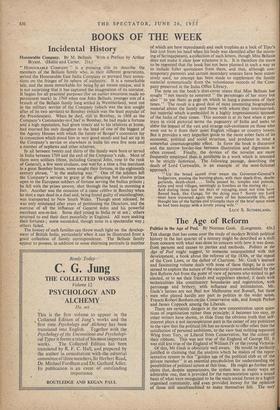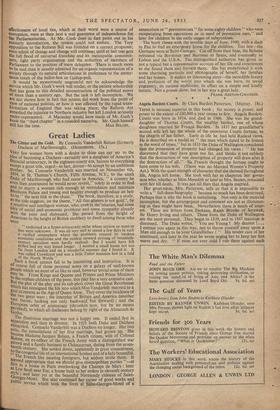The Age of Reform
Politics in the Age of Peel. By Norman Gash. (Longmans. 45s.;
THE change that has come over the study of modern British political history in the last quarter of a century might be described as a shift from concern with what was done to concern with how it was done, from persons and causes to parties and methods. Politics in tht Age of Peel might suggest, to someone unacquainted with thi! development, a book about the reforms of the 1830s, or the repeal of the Corn Laws, or the defeat of Chartism. Mr. Gash's learned and fascinating volume deals with none of these things; he is con• cerned to explore the nature of the electoral system established by the first Reform Act from the point of view of persons who wished to gel elected, or to see their friends and supporters elected; it deals with technicalities like constituency boundaries and registration, with patronage and bribery, with influence and intimidation. Mr. Gash's heroes are not Peel nor Melbourne nor Russell, but three men who played hardly any part in politics in the wider sense Francis Robert Bonham on the Conservative side, and Joseph Parke! and James Coppock among the Liberals.
There are certainly dangers in the new concentration upon ques' tions of organisation rather than principle; it becomes too easy, a! other writers have shown, to slide from the obvious truth that self interest plays a not inconspicuous part in the career of any politician to the view that the political life has no rewards to offer other than the satisfaction of personal ambitions, to the view that nothing separate! Whig from Tory, or Liberal from Conservative, but the colour of their ribbons. This was not true of the England of George III; it was still less true of the England of William IV or the young Victoria
Of this, Mr Gash is obviously well aware. He would be perfectly justified in claiming that the analysis which he makes of the repre• sentative system in this "golden age of the political club as of the private member" is an essential preandition for understanding the possibilities of political action at this time. He might go further and claim that, despite appearances, the system was in many ways an admirable one, that it provided for the representation upon a sound basis of what were recognised to be the main social forces in a highly organised community, and even provided leeway for the opinion! of those still unenfranchised to make themselves felt. The very effectiveness of local ties, which at their worst were a source of corruption, were at their best a real guarantee of independence for. the Parliamentarian. As Mr. Gash does in fact point out in his masterly introduction, the system could not endure. The Tory opposition to the Reform Bill was founded on a correct prognosis; once admit of change and change will continue; until at last one gets the full flood of universal franchise and its inescapable concomit- ants, tight party organisation and the reduction of members of Parliament to the position of mere delegates. There is much more to be said than is usually admitted fOr an organic representation of a society through its natural articulations in preference to the anony- mous totals of the ballot-box or Gallup-poll.
It would be monstrously ungrateful not to acknowledge the service which Mr. Gash's work will render, or the patient scholarship that has gone to this detailed reconstruction of the political mores of more than a century ago. But the task is left incomplete. We are not shown how in fact this system did work from the point of view of national politics, or how it was affected by the rapid trans- formation of England that was taking place; the Reform Act remedied the injustice to Northern industry but left London seriously under-represented. A Macaulay would have made of Mr. Gash's book the "third chapter" in a rounded narrative. Mr. Gash himself



































 Previous page
Previous page